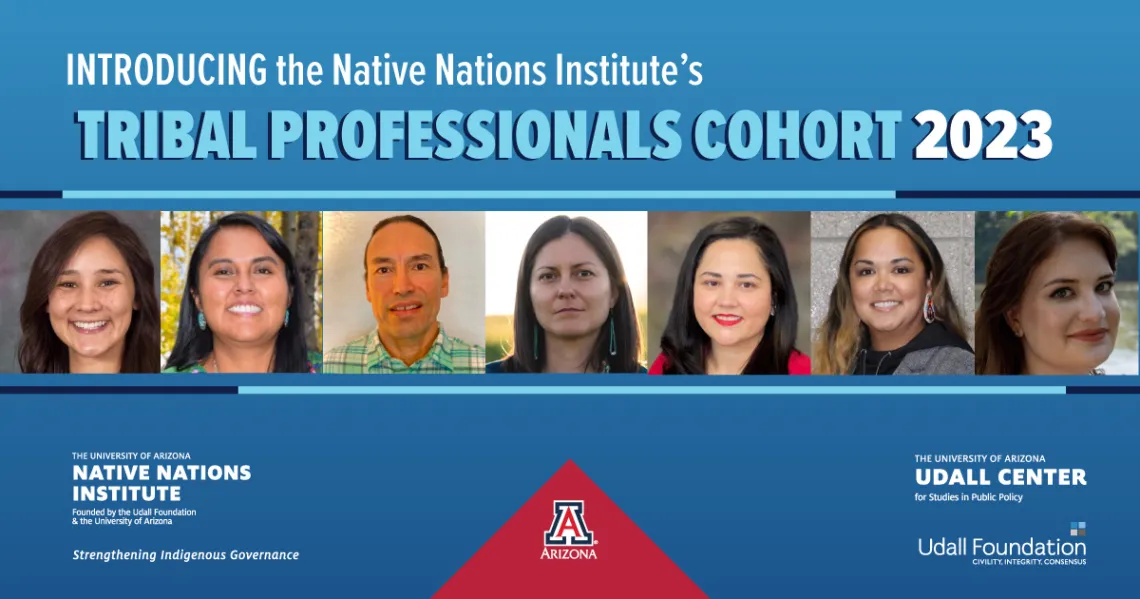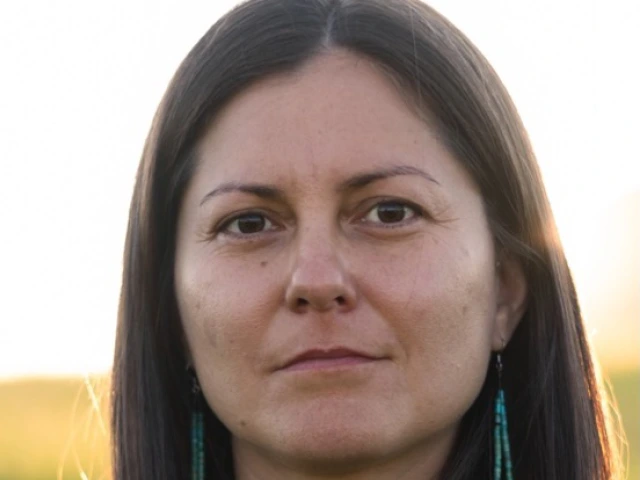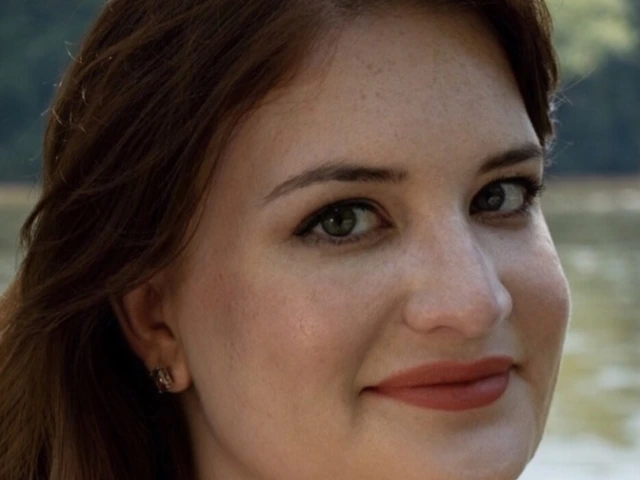Introducing the Seven New Tribal Professionals Cohort Members for 2023

The Native Nations Institute’s Tribal and Direct Services (TDS) team is thrilled to announce the selection of the 2023 Tribal Professionals Cohort!
The Tribal Professionals Cohort (TPC) began in 2016 as an effort to directly respond to the realities and challenges facing Tribal Professionals that serve Native communities while maximizing available opportunities for those individuals to better serve their communities.
Each year, the TDS team selects ten or fewer individual applicants to serve in a year-long commitment as part of the Cohort for that year. Members of the TPC are granted a tuition waiver to attend up to three accelerated Masters-level courses during the Native Nations Institute’s (NNI) annual January in Tucson event, which is held in partnership with the James E. Rogers College of Law Indigenous Governance Program.
Members also participate in quarterly seminars and other networking events with NNI faculty and staff throughout the year to help them find creative solutions to the most pressing issues in Indigenous governance.
To be eligible to participate in the TPC program, applicants must be a citizen of a U.S. Native nation and express an interest in learning more about Indigenous governance. Preference is given to current tribal government practitioners, community leaders, and individuals who can demonstrate their ability to use the information they learn to benefit their tribal communities.
This year’s Cohort includes seven professionals representing seven different Native nations with interests and expertise including law, public health, Indigenous food sovereignty and more.

Dr. Joshua Brown (Fort Belknap Indian Community)
Joshua Brown lived most of his life in the Confederated Salish and Kootenai Nation among his mother's Salish family, but he also has strong ties to his father's Nakoda/Aaniiih family in the Aaniiih and Nakoda Nation. He successfully defended his Ph.D. in anthropology in November 2022 and is now a Postdoctoral Associate at the University of Colorado within Exchange of Local Observations and Knowledge of Arctic (ELOKA), where his work focuses on Indigenous data and storytelling. This position allows Joshua to gain more experience in multimodal anthropology and help Indigenous populations convey their perspectives and lived realities to improve their lives and health. As a University of Montana graduate student, Joshua examined Salish people's food system and diet-related health outcomes while earning a Master of Public Health in a Community Health and Prevention Sciences Concentration and a Ph.D. in Cultural and Applied Anthropology. His work highlights the Salish people's quest to protect, enjoy, and perpetuate access to their traditional foods and explores Salish concepts of food sovereignty. Joshua also serves on a food sovereignty committee of the Confederated Salish and Kootenai Nation, assisting with establishing an initiative to create new food policy and programming within the CSKN government.

Danya Carroll (Diné (Navajo) & White Mountain Apache)
Danya Carroll has worked with the White Mountain Apache Tribe for the past couple years. She is also currently an Indigenous Health Ph.D. student in her third year at the University of North Dakota. Danya has more than 10 years’ experience working within tribal food systems and has led and facilitated projects aimed at improving nutrition and food access in tribal communities. Danya has experience in public health programming in the research, nonprofit and tribal sectors. Her research and public health interests include food sovereignty, nation building, cultural preservation, language promotion and community-based programs. Danya has a MPH in Community Health Education from the Colorado School of Public Health, as well as a Bachelor’s of Science in Microbiology from the University of Arizona.

Dr. Nicole Halmai (Diné (Navajo))
Dr. Nicole Halmai is a postdoctoral researcher in the laboratory of Dr. Luis Carvajal-Carmona at the University of California, Davis (UC Davis). Her research includes molecular epidemiology, cancer functional genomics and cancer health equity, with a specific emphasis on addressing health disparities for American Indians and other Indigenous communities. Nicole graduated from Denison University in 2013 with a BS in Biology and earned her Ph.D. in Molecular, Cellular and Integrative Physiology from UC Davis in 2019. During her studies, Nicole developed a novel genome editing platform for the functional modeling of cancer risk-associated variants. She co-founded the student-lead organization ESTEME at UC Davis, with the purpose of promoting diversity and equity in the STEM disciplines. Her current research is focused on the generation and characterization of pre- clinical models of gastric cancer from racial/ethnic minority populations in the US. As part of a multi-cancer center initiative, Nicole has helped to determine unique molecular patterns of cancer development in racial/ethnic minorities to inform more effective therapies and address the cancer health disparities currently afflicting these communities.

Renee Hutchens (Diné (Navajo))
Renee Hutchens is a communications and policy strategist, writer, and filmmaker dedicated to activating narrative change and advancing justice, equity, and self-determination for Indigenous peoples and the planet. She has ten years of public health experience including grant management, policy analysis, campaign development, substance abuse research and prevention, and digital storytelling. Her previous roles as a Tribal Liaison, and Health Communications and Policy Lead at the Centers for Disease Control (CDC) has led to her current work as a consultant, including projects and stories that focus on health and human rights, land stewardship, conservation, decolonization, policy, and environmental issues. Renee holds a Bachelor of Arts in Native American Studies from Dartmouth College and a Master of Public Health from the Colorado School of Public Health. She’s also a member of the Native American Journalist Association (NAJA), the Native American Fish and Wildlife Society, Missing and Murdered Diné Relatives working group, and proud supporter of the Coalition to Stop Violence Against Native Women.

Meredith Jolin (Catawba Nation)
Meredith Jolin is the Director of Justice Services for the Catawba Nation. She is a licensed attorney in South Carolina and has over six years of experience working within tribal courts in litigation and program development. After graduating from Brigham Young University’s J. Reuben Clark Law School in 2016, Meredith began working for the Salt River Pima-Maricopa Indian Community Legal Services office as a civil advocate. In 2019, she began her employment with the Catawba Nation, helping to develop the Nation’s healing to wellness court. In her current role as Director of Justice Services, her primary responsibilities include the creation and development of the Catawba Tribal Judicial system. Her areas of focus include cultural integration and serving at-risk populations.

Danielle McLean (Lumbee Tribe of North Carolina)
Danielle McLean received her B.A. in Political Science from the University of North Carolina at Chapel Hill in 2007, where she was recognized as a James Johnson Scholar. She then earned her Juris Doctorate in 2010 from the University of North Carolina School of Law and was admitted to the North Carolina Bar in 2010. For the next seven years, Danielle worked in private practice focusing on Abuse, Neglect, and Dependency proceedings. In 2016, Danielle was hired as the Legal and Compliance Officer for the Lumbee Tribe of North Carolina. Since joining the Lumbee Tribe, she has worked on the Tribe’s federal recognition efforts, federal grant compliance, Tribal Housing and Tribal Enrollment. Danielle also serves as a board member for Lumber River United Way and the North Carolina Juvenile Justice Planning Commission.

Anna Ross (Turtle Mountain Chippewa)
Anna Ross has several years’ experience working successfully with urban, rural, and tribal communities throughout the states of North Dakota and Minnesota. She has led and participated in grassroots community work and advised tribal government leaders, directors, and state officials. With a master’s degree in Indigenous Nations Studies and 15 years of administrative/ supervisory experience, Anna has led several non-profits, worked in education, and facilitated community trainings. She has also held several positions as a liaison and connector between federal, state, local and tribal organizations. All of this experience has provided Anna with the tools necessary to provide instruction and guidance to Turtle Mountain Community College students as a Leadership & Management Instructor and Advisor.

